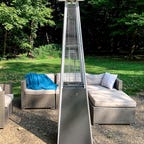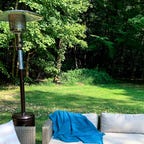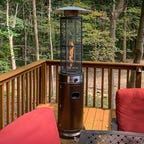Best Patio Heaters of 2024
Enjoying the backyard all year long is doable with a gas-powered patio heater. We've tested the best patio heaters so you can warm your limbs on cold days.
Our Picks
Outdoor gatherings can happen anytime with the best outdoor patio heaters. These are sure to keep your space warm when it isn't so warm outside. There are a variety of sizes and types of patio heaters, this article will focus on propane heaters. Over roughly 15 hours, I've discovered which of these are most worth the money.
Seven propane heaters, in two distinct styles (a traditional pole and a more modern pyramid shape) were tested in total. During the initial evaluation period, the price range landed roughly between $150 and $500, but prices have since increased due to supply shortages. If and when we see major changes in prices and availability -- or we've tested newer models worthy of this list -- we'll update this story accordingly.
Best patio heaters of 2024
Initially, I picked the Hiland HLDS01-GTCB pyramid patio heater as the best model I tested. With its pyramid shape and glass tube running the center length of the stainless steel heater, it has a more modern look than the pole and saucer style of a traditional patio heater or a commercial patio heater. Similar to staring at a campfire, watching the flame continuously rising through the glass tube is absolute entertainment. It throws heat, too.
Looking at all the points I measured within four feet, you'll see an average temperature increase of 4.59 degrees. Within two feet of the pyramid heater, averaging all points, you get a change of 7.49 degrees. Within one foot, this outdoor heater provided an average temperature increase of 11.72 degrees, which happens to be the highest average recorded. Some heaters reach higher temperatures at certain points, but this one has even heat distribution when you are near it. The Hiland also has an easy-to-use control system that lights effortlessly every time.
One downside to this model is that it's a little less of a portable patio heater than some others; it's heavy, and even though it has wheels, it's unnerving rolling the glass tube across a rough surface like concrete. If you try to carry it, the safety guards will come unset. The hinges the door rests on have also already started bending. While I like staring at the flame, this heater illuminates the surrounding area so much that you or your neighbors might find it too bright.
This 40,000 BTU standing heater is priced around the middle of the pack and comes with a one-year limited warranty. This isn't the hottest heater of the bunch, but it will warm you up if you can stay close to it, and I really liked its appearance.
Best patio heater overall
XtremepowerUS
The best performer on our list of patio heaters goes to the model 96054 by XtremePowerUS. This heater checks in at 48,000 maximum BTUs and it shows. All measurements within two feet of the heater average out to a temperature increase of 7.51 degrees. All measurements within four feet read 4.78 degrees warmer than ambient. This traditional-style heater has a base, a pole and a heating element up high, with a saucer above for reflection.
Instead of an access door like many of the other models, this one has a base that lifts up to access the propane tank. It has wheels to assist with moving, but I find the traditional style pole heaters balance nicely and are easy to carry from one point to the other.
Unlike many of the other heaters that come with a one-year limited warranty, this one is only covered for 30 days from purchase. Pricing for this one seems to vary a bit, but I originally picked this heater as the best performer when I found it for $249.
Editors' note: While this model is currently out of stock, the $330 HomeLabs heater provides an excellent alternative. It delivered powerful and even heating in my testing and is available for a fair price.
Space saver
Cambridge CCL031-BR (Update: Out of Stock)
Full disclosure: I had high (maybe unrealistic) expectations for patio heaters. Anytime I saw one at an outdoor venue, it always burned hot enough to warm the surrounding area sufficiently. These do burn hot (up close), but they don't seem as sturdy as I expected. They tend to feel a little cheap. Normally, I would take into account features, ease of use, looks, etc. to determine the winning model, but other than some models requiring AA batteries for the igniter and one model having an adjustable table, these units are all so similar.
The Cambridge propane patio heater stands out in this crowd based on looks alone. It's the shortest -- only 6 feet tall -- and has a glass tube structure similar to the Hiland model. The unit feels sturdier than some of its competitors, and the mesh guard around the heating body stayed put throughout the moving and testing process. It's compact, easy to carry and will take up less storage space during the warmer months.
Performance-wise, this freestanding patio heater didn't deliver as well as some of the others, as you would expect from a 34,000 BTU unit. With a $447 price tag, this heater is only worth it if the aesthetics, sturdiness and size are more important to you than the performance and heat output.
Other patio heaters we tested
In addition to the models above, we tested these other propane heaters:
How we tested patio heaters
All of the heaters arrived packed in boxes and required assembly. The level of difficulty was roughly on par with assembling Ikea furniture: some manuals occasionally needed a little interpretation.
Of the traditional-style pole heaters, there was so little variation between the products -- from assembly to operation to looks -- that they might as well have all come from the same factory. Nevertheless, I followed each set of instructions as they were written to ensure testing accuracy. By the time I got to the last of the pole heaters, I was a pro and it was a breeze. Nothing about the assembly process really stood out, except for the fact that it highlighted the similarities between all of the traditional models. I was pretty happy to see that Amazon sent not one, but two cheap wrenches to aid my efforts. The excitement was short-lived because the pyramid-style heaters were a little trickier to put together.
Cordless drill-powered testing rig. It's important to be able to raise the thermocouples quickly during the testing process
None of the heaters I tested are going to sweat you out at long distances, but getting up next to one will certainly warm you up. Some manufacturers claim the heater will warm up to eight feet away from the heater, and the results prove that to be true -- sort of. All but one heater showed an increased temperature at eight feet away. Keep your coat on, because at that distance we're talking about only half a degree warmer than the ambient temperature. The warm glow on your face will be nice, but you're going to need to move closer to the heater's flame to keep warm on the coldest days. I took temperature measurements at four set elevations relative to the heater's cap, and 11 equal distances from the heater for a total of 44 points of measurement. Because a patio heater isn't necessarily made to warm at a distance, the useful range for most of them is about four feet.
I measured each unit by recording temperatures with a one-dimensional, horizontal array of 11 thermocouples that I moved to four different elevations. The thermocouples, starting one foot away from the burner, are each placed in one-foot intervals. For test equality, the elevation of the thermocouples are determined by the height of the unit being tested: 10, 20, 30 and 40 inches below the unit's cap. I then compared the temperature at each location to the ambient temperature (also recorded by a thermocouple removed from the reach of the heater's effect). I don't have a temperature-controlled environment here at my home in southern Indiana, so I tested all of the heaters in one session, to minimize the difference of the ambient conditions on the test results. To get through the tests as quickly as possible I put together a drill-powered system to raise and lower the array of thermocouples to premeasured elevations.
What to consider when buying a patio heater
Coverage area
Most outdoor patio heaters will heat an area to a radius of at least 10 feet, but some can blast warmth a bit farther than that. Determine how much or little space you need to heat regularly. If the area you want to heat extends farther than 10 feet from the heater, you might consider purchasing two heaters.
Style: Pole or pyramid
The two main styles are traditional pole heaters and more modern pyramid-style patio heaters. This is more a matter of taste, but it's worth noting that the pyramid heaters we tested were slightly more difficult to assemble.
Cost an value
Reliable patio heaters start at around $150 and go up from there. The more powerful patio heaters with sleek design elements will cost you closer to $400 or $500.
View from the side showing the temperature increase at every measured point. Data was recorded at 10-inch intervals, starting at 10 inches below the heater's cap and extending 4 feet out from the heater.
Real-world application
After crunching the data, the Hiland heater emerged as a strong contender. It was one of the hottest models I tested, and when you combine that with the cool visuals of a flame darting up a glass tube, it seemed like a no-brainer.
Then I added an extra step to the test: sitting outside beside each heater on a cooler evening. That revealed something that the thermocouples didn't: the traditional pole-style heaters give off a much more concentrated heat. When I was sitting next to one, I felt comfortably warm. While the glass tube of the Hiland heater still performs pretty well -- and looks neat -- having the heat dispersed along the length of the tube simply didn't warm me up as thoroughly.
As I mentioned earlier, a lot of the heaters were similar. When I tested them, it was clear that the Hiland and Amazon model 62516 -- despite being nearly identical pyramid-style tube heaters -- weren't alike. The Hiland was one of the best-performing; the Amazon 62516 was one of the worst. Upon inspection, the reason was clear: the only difference was in the regulator controls. That simple variation made all the difference, and it proved true among several of the identical pole heater models, too.
When all of these heaters appear so similar, it may also be tempting to choose one based on additional accessories. The model from HomeLabs had one that stood out: a table attached to the heater. I wouldn't recommend putting your cold beer on a table attached to a heater.
Patio heater FAQ
How much propane do patio heaters use?
While it varies by model, you should expect about 10 hours of patio heater use from a single 20-pound tank of propane.
Can you use a patio heater in a covered area?
Yes, but some clearance guidelines must be adhered to to ensure safe use of any unit. Those specifications will vary based on the design and power of your patio heater, so be sure to consult the manual before igniting in a covered or enclosed space.
Do patio heaters work well?
A patio heater is limited in how large of an outdoor area it can heat. That said, a good patio heater can raise the temperature as much as 25 degrees in its immediate area.


